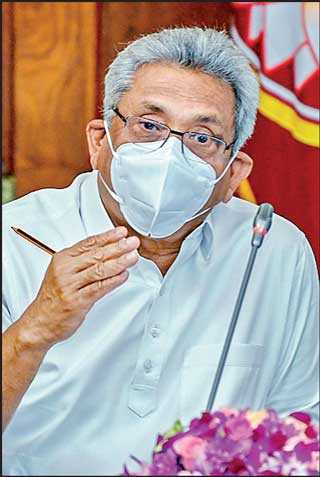Wednesday Jan 07, 2026
Wednesday Jan 07, 2026
Thursday, 15 October 2020 00:00 - - {{hitsCtrl.values.hits}}
By Nisthar Cassim
Akin to walking the talk, the Government has announced specific preference and support measures to boost the local industries of IT software and hardware, construction and furniture and allied products in
 |
| President Gotabaya Rajapaksa
|
 |
| Prime Minister Mahinda Rajapaksa
|
all procurements by State institutions.
Finance Ministry Secretary S.R. Attygalle last week issued a public finance circular to all secretaries to ministries, State ministries, chief secretaries of provincial councils, heads of department and district secretaries, heads of local government authorities, chairmen of government corporations, statutory bodies, and chairmen of State-owned companies outlining the new policy on supporting domestic industries.
The move is a follow-up to pledges made during the successful President and Parliamentary Election campaigns by President Gotabaya Rajapaksa and Prime Minister Mahinda Rajapaksa to extend support to domestic industries.
Analysts said the new procurement guidelines are by far the most explicit and emphatic support to date by a government to local manufacturers and service providers.
Host of chambers of commerce and industry as well as entrepreneurs have urged for preference to local suppliers in government procurement. One reason why is to prevent outflow of foreign exchange reserves, especially during crisis times but more importantly, to foster local entrepreneurship. In that context, the Government’s latest move is being welcomed as a big boost.
The circular defines domestic majority ownership, domestic firm or local companies as an entity first registered with a relevant authority in Sri Lanka with more than 51% ownership held by Sri Lankan nationals.
It lists out specific procurement guidelines when sourcing products and services on the three core industries: IT software and hardware, construction, and furniture and allied products. Official sources said that the Government is considering expanding the support to the domestic sector by adding more industries going forward.
As per the circular, when procuring software products (developed, customised, value-added, or software
as a service), the procedure to follow should be in calling for bids for the procurement of application software, where the estimated cost is less than Rs. 2 million, such bids shall be called exclusively from startups, registered with the Information Communication Technology Agency (ICTA) and published on the website (https://startupsl.Ik). For this purpose, startups are those that have been registered as a business with a relevant authority for more than six months and not less than five years, and also registered on https://startupsl.lk
When bids are called for the procurement of software or information communication technology (ICT) solutions estimated to be over Rs. 2 million, preference must be given to domestic majority ownership firms also offering software solutions with a minimum 25% local value addition.
To ascertain local value addition, the bidder should submit detailed cost breakdowns of local value addition along with the financial proposal and at the evaluation stage, the bidders should provide a certification from an authorised auditor, certifying such value addition and the cost breakdowns of foreign and local components in USD and LKR.
Value addition will include cloud solutions and contribution of any of the following:
a) local material; b) expertise (minimum 10% of expertise out of 25% of local value addition); and c) local overheads support/maintenance/systems integration.
Such bidder that satisfies the requirement for at least 25% local value addition should be awarded 30% preference for the prices quoted by the respective bidder over the other bidders only in the financial evaluation and not in the technical evaluation.
When procuring IT hardware products, preference should be given for domestic firms offering at least
25% local value addition in hardware in terms of manufacturing or assembling categories, where value addition would be recognised in the following categories: a) material - minimum 5% of local material out of 25% of local value addition; b) expertise/labour; and c) local overheads support/maintenance software.
To ascertain local value addition, the bidder should submit detailed cost breakdowns of local value addition along with the financial proposal, and at the evaluation stage the bidders should be required to provide a certification from an authorised auditor certifying such value addition.
Such firm that satisfies the requirement for at least 25% value addition should be awarded 30% preference in the financial evaluation and not in technical evaluation.
Same criteria applies for composite solutions (with hardware, software, systems integration and or maintenance) provided if the composite local value addition is above 25% for the total solution.
To ascertain local value addition, the bidder should submit a detailed cost breakdown of local value addition along with the financial proposal, and at the evaluation stage, the bidders should provide a certification from an authorised auditor certifying such value addition.
Finance Ministry circular says standard technical specifications designed by ICTA should be used when calling for bids for the procurement of laptops and desktop personal computers.
Specifications for such desktops and laptops are made available in the ICTA website. The government organisations can select machines according to the optimal requirements of the users. The specifications will be updated time to time by the ICTA.
Respective procurement entity must consult ICTA for any deviations in the ICT industry relating to technical matters and ambiguities in the above procedure, and the decision of ICTA should be considered as final.
Construction industry, furniture and allied appliances
For the construction industry procurements, the procedure is as follows:
Bids to be called exclusively from Construction Industry Development Authority (CIDA) graded contractors with a grading of C5, C6, C7, C8 and C9 for all construction contracts that are estimated to be less than or equal to Rs. 25 million, whilst adhering to Clause 3.3 of the Public Finance Circular No. 04/2016(ii) dated 8 May 2019.
When bids are called for contracts with an estimated cost of more than Rs. 25 million and less than or equal to Rs. 50 million, only contractors with a CIDA grading of C5 and C4 will be allowed to bid.
When bids are called for contracts with an estimated cost of more than Rs. 50 million and less than or equal to Rs. 150 million, only contractors with a CIDA grading of C4 and C3 will be allowed to bid.
For contracts with an estimated cost of more than Rs. 150 million, and up to Rs. 600 million, bids will be called exclusively from local companies (consultants and construction contractors) with a CIDA grading of C3 and C2, based on the corresponding estimated contract limits as recognised by CIDA.
For contracts with an estimated cost of more than Rs. 600 million, bids should be called exclusively from local companies (consultants and construction contractors) with a CIDA grading of C1 and above, based on the corresponding estimated contract limits as recognised by CIDA.
Considering the role of the State-owned enterprises (SOE) in these industries, when such SOE submits a bid for a contract on competitive basis then such SOE will be given a 15% preference over all other contractors. This will be considered only at the financial evaluation and not in technical evaluation.
To ensure that the bids are not unrealistic, the following criteria should be adopted:
If the bid value is less than or greater than 15% of the engineers’ estimate, the bid should be rejected.
In the event there are number of outliers with substantial cost deviations from the engineers’ estimates, in a particular tender, appropriate action shall be taken to revisit the engineers estimate before resorting to the above action.
For the purpose of supporting the small and medium size firms in the construction industry, the main contactor shall award a minimum 25% of the work as subcontracts (either civil, mechanical, electrical, plumbing, etc.) to contractors with the relevant CIDA registration.
Main contractor should not subcontract more than 10% of the contract price excluding provisional sums to foreign contractors.
For local construction contracts when 18 specified goods and materials are required under the BOQ, such goods and materials should be sourced exclusively from domestically manufactured/produced goods/materials.
When furniture and allied products, are procured either as part of a works contract or as a separate goods contract, all furniture must be sourced exclusively from domestic sources, with minimum of 70% value addition and 50% value addition, respectively, for timber-based furniture and non-timber-based furniture. In order to encourage usage of imported timber, the cost of imported timber will be accounted when calculating domestic value addition.
The Finance Ministry said the criteria relating to granting of domestic preference would be applicable only for the software and hardware industry, construction industry, and furniture and allied products industries, while ensuring provisions articulated under Procurement Guidelines 2006 (Goods and Works) section 7.9.4, 7.9.5 and 7.9.6, as appropriate and related supplementary regulations issued to the Procurement Manual (Goods and Works), will continue to remain applicable as it is for all other procurements of goods and works.
Further, Public Finance Circular No. 04/2016 dated 16 March 2016 and further amendments thereto will also remain applicable. This Circular is issued with the concurrence of the National Procurement Commission.
The list of 18 domestically manufactured/produced building materials are:
1. Cement
2. Reinforcing steel and certain sections of steel angles
3. Clay bricks, cement blocks, and concrete products
4. Roofing material (clay tiles, cement titles, asbestos, zinc alum, GI)
5. Ceramic and granite tiles
6. Parquet and wooden flooring
7. Pantry cupboards and wooden furniture
8. PVC and UPVC pipes, gutters, downpipes and fittings
9. Electrical cables LT
10. Transformers with accessories
11. Electrical switches and sockets, ceiling fans
12. Aluminium extrusions, doors and windows
13. Sliding/roller shutter doors and gates
14. Plywood doors, wooden doors, fibreglass doors and steel doors, including fire rated
15. Brass ironmongery
16. Paints
17. Water pumps, foot valves
1 8. Electrical panel boards